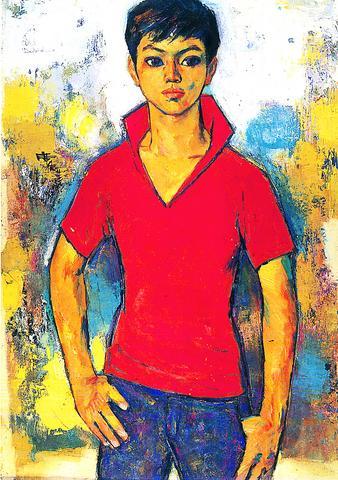One of the most popular painters of the 1970s, Shiy De-jinn (
Accompanying the publication of Shiy's dairies by Unitas Publishing, the National Museum of History (

PHOTO COURTESY OF NMH
The National Museum of History held two large-scale exhibitions of Shiy's work two decades ago. There has been renewed interest in Shiy and his distinctly local flavor, and many public museums and galleries have held solo exhibitions of Shiy's work in recent years.
Shiy, who moved from his hometown in Sichuan to rural Chiayi when he was 23, is most appreciated for a series of realistic oil paintings of the Taiwanese countryside. These are regarded as the best of Shiy's works and are especially valued for being among the first works by a Taiwanese artist to consciously present the natural beauty of the country. Shiy is also among the first to recognize the importance of preserving the cultural heritage in Taiwan.
Apart from landscape, Shiy's portraiture is increasingly celebrated. The small-scale exhibition "Spiritual Realism -- A selection of Shiy De-jinn's Portraits" (
Boy in Red (
Shiy might have agreed. "A successful portrait is finished by the collaboration between the painter and the model. Its success is through the communication of the two minds," Shiy once wrote.
A passionate artist tortured by his closet homosexuality in conservative 1960s and 1970s Taiwan, Shiy is known to express himself through painting beautiful young men. In the current exhibition, however, the majority of the works are of Shiy's artist friends. The sketches and oil paintings of the same subjects are placed side by side to serve as comparisons.
Shiy's portraiture has the uncanny ability to express the consciousness of his models through depiction of their eyes and posture. These models, mostly artists on the brink of success in the 1960s and 1970s, include painters Wu Hao (吳昊), Li Shi-qi (李錫奇) and Chen Ting-shi (陳庭詩), all seem to be looking at their dreams and ambitions, which they later realized. Shiy managed to place them against seemingly simplified backgrounds that express how their minds intently scrutinize the world around them. Shiy's friendship with his models helped him produce these intimate depictions.
The Poet (詩人), a portrait of the reclusive poet Zhou Meng-die (周夢蝶), is another highlight of the show. The beautifully composed portrait, in which the subject placed as if in a state of nirvana, oblivious to his surroundings, is probably the best of the widely-acclaimed literary master who chose a life of poverty and solitude.
Spiritual Realism will run till Aug 24 at National Museum of History, 49 Nanhai Rd, Taipei (

June 9 to June 15 A photo of two men riding trendy high-wheel Penny-Farthing bicycles past a Qing Dynasty gate aptly captures the essence of Taipei in 1897 — a newly colonized city on the cusp of great change. The Japanese began making significant modifications to the cityscape in 1899, tearing down Qing-era structures, widening boulevards and installing Western-style infrastructure and buildings. The photographer, Minosuke Imamura, only spent a year in Taiwan as a cartographer for the governor-general’s office, but he left behind a treasure trove of 130 images showing life at the onset of Japanese rule, spanning July 1897 to

In an interview posted online by United Daily News (UDN) on May 26, current Chinese Nationalist Party (KMT) Chairman Eric Chu (朱立倫) was asked about Taichung Mayor Lu Shiow-yen (盧秀燕) replacing him as party chair. Though not yet officially running, by the customs of Taiwan politics, Lu has been signalling she is both running for party chair and to be the party’s 2028 presidential candidate. She told an international media outlet that she was considering a run. She also gave a speech in Keelung on national priorities and foreign affairs. For details, see the May 23 edition of this column,

The Taiwan People’s Party (TPP) on May 18 held a rally in Taichung to mark the anniversary of President William Lai’s (賴清德) inauguration on May 20. The title of the rally could be loosely translated to “May 18 recall fraudulent goods” (518退貨ㄌㄨㄚˋ!). Unlike in English, where the terms are the same, “recall” (退貨) in this context refers to product recalls due to damaged, defective or fraudulent merchandise, not the political recalls (罷免) currently dominating the headlines. I attended the rally to determine if the impression was correct that the TPP under party Chairman Huang Kuo-Chang (黃國昌) had little of a

At Computex 2025, Nvidia CEO Jensen Huang (黃仁勳) urged the government to subsidize AI. “All schools in Taiwan must integrate AI into their curricula,” he declared. A few months earlier, he said, “If I were a student today, I’d immediately start using tools like ChatGPT, Gemini Pro and Grok to learn, write and accelerate my thinking.” Huang sees the AI-bullet train leaving the station. And as one of its drivers, he’s worried about youth not getting on board — bad for their careers, and bad for his workforce. As a semiconductor supply-chain powerhouse and AI hub wannabe, Taiwan is seeing